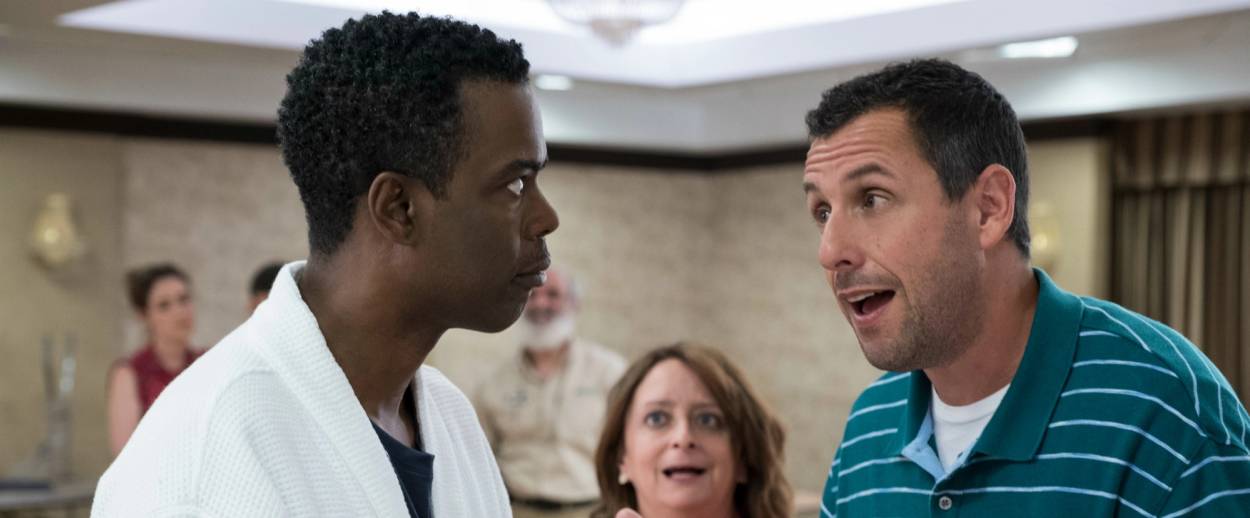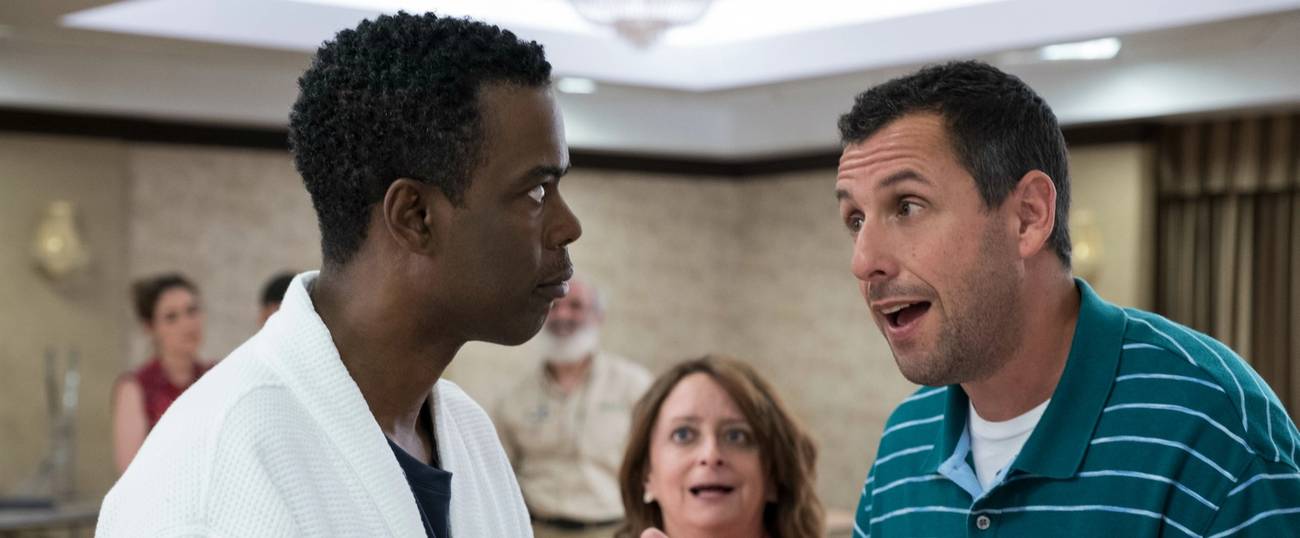Adam Sandler’s New Role Is His Most Daring Yet: Working Class Jew
In the charming comedy ‘The Week Of,’ a reminder that warmth trumps wealth every time




I hadn’t really been wondering where Adam Sandler went. I had a vague idea, because I am friends with one crazy, punch-drunk Adam Sandler fan, that he was still making movies, but if you had asked me to name a movie he’d made since, say, Funny People (2009), I’d have shrugged and cued up “The Chanukah Song,” which makes the case as well as any bit of culture that America peaked during Bill Clinton’s first term (Infinite Jest and the peak years of Beverly Hills 90210 round out my case).
But again, I do have this drunk-ass friend who has kept watching Adam Sandler movies, even after they left the theaters and migrated to Netflix, where Sandler has just re-upped for another straight-to-streaming film deal. And he alerted me that the latest Sandler venture, The Week Of, co-stars Chris Rock. And Steve Buscemi. And was cowritten by the great Robert Smigel. So I thought, I’ll bite, and maybe the movie won’t.
And wouldn’t you know, The Week Of is pretty great, even if it’s not very good. The script has a first-draft feel, the acting is uneven, the editing was has a very Lifetime, movie-of-the-week feel, there’s too much Billy Joel (indeed, it’s an all Billy Joel soundtrack) even for a superfan like me, and some fine actors (looking at you, Allison Strong) are under-used. But The Week Of is not the least likely movie of 2018 to become a cult classic. It has some decent double-amputee humor, it’s highly racial without being racist, and there are Jell-O shots in penis molds.
And while continuing Sandler’s long-time engagement with Jewish issues (cf. all the iterations of “The Chanukah Song,” plus You Don’t Mess with the Zohan, the extreme Jewiness of Funny People, even a character in Punch-Drunk Love named, yes, Barry), The Week Of manages to do something quite unusual, especially for 2018: he depicts, with affection but no sentimentality, lower-middle-class Jews. Class-wise, movie Jews usually come in two types: affluent (most of them) and poor (Holocaust survivors, bubbes on a pension living in a rent-controlled walk-up, haredim with ten children). I can’t think of another movie in which a Jewish nuclear family of mom, pop, and three children have trouble making ends meet, but do it anyway.
The principle of the movie is a basic ethnic switcheroo: There’s an interfaith, inter-ethnic wedding, not big, fat, or Greek, but black-Jewish—and the black family is rich (and classy), the Jewish family working-class (and tacky). The black father of the groom, Kirby Cordice, played by Chris Rock, is a philanderer, but otherwise he is a credit to humanity, a heart surgeon who has raised a gentleman and a scholar, the med-school-bound Tyler. His whole extended African American family, which descends on West Hempstead, Long Island, the bride’s turf, for the wedding, is discerning, well-dressed, and genial. By contrast, the father of the groom, Sandler’s Kenny Lustig, is a struggling commercial contractor: when he picks Cordice up at the airport, and drives him back to his house in an overheated LIE traffic jam, he refuses to turn on the air conditioning in the car, because it wastes gas.
Lustig is, in short, a Jew who never made it. His whole life is on the ’gisland; he gets no further west than Citi Field; he cried when Mike Piazza retired. There are no books in his house, no Ivy League diplomas on his wall. The bride, Sarah, headed for dental school, seems to be the clan’s first and last shot for upper tier of the middle class. Lustig’s wife, played by Rachel Dratch, is well-meaning, but she’s uncouth and shrill, without the confidence that wealth bestows on some of the uncouth and shrill. One gets the sense she’s been a bit depressed since Loehmann’s closed.
But the Lustigs are close-knit, loyal, and loving, which means they have something to teach the more credentialed, better-coiffed, but frostier Cordices. When Great-uncle Seymour, the family double-amputee, dies after a bachelor-party incident involving strippers and a foam-ball pit, the Lustigs find comfort in their local suburban synagogue. At the wedding reception, it’s the bride’s side, unworried about decorum, who know how to get down. And when, under the chuppah, the black groom, having studied up, sings “Ani l’dodi v’dodi li” to his beloved Jewess, his relatives look on with admiration, as if everyone in the room knows that while he brings the money, she’s the one who, with all her crazy relatives, brings the warmth. (Bonus: at the rehearsal dinner, there’s a decent Drake joke about the future black, Jewish grandchildren.)
The Week Of gives us something rare in the movies, an identifiably Jewish family that is neither predictably rich nor romantically poor. “I think I’ve seen you in a suit three times,” Sarah says to her dressed-up dad, right before the rehearsal dinner, “my bat mitzvah, my high school graduation, and when you took us to the city to see Phantom.” That’s the kind of Jew that Kenny Lustig is, and, as Billy sings on the soundtrack, things are okay with him these days.
Mark Oppenheimer is a Senior Editor at Tablet. He hosts the podcast Unorthodox. He has contributed to Slate and Mother Jones, among many other publications. He is the author, most recently, of Squirrel Hill: The Tree of Life Synagogue Shooting and the Soul of a Neighborhood. He will be hosting a discussion forum about this article on his newsletter, where you can subscribe for free and submit comments.